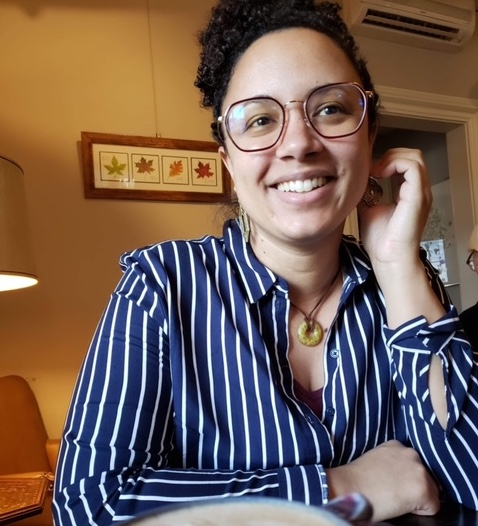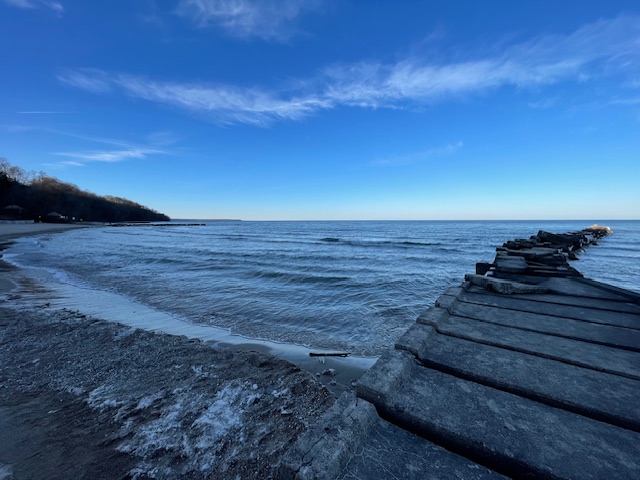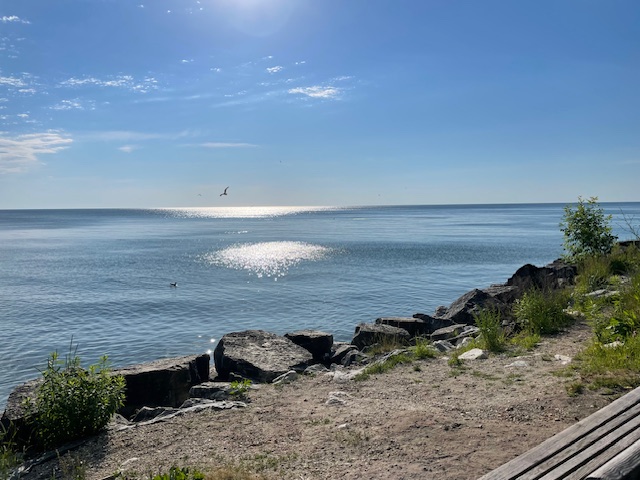For our first in our new Feminist Bioethics Scholar Spotlight Series we are thrilled to feature Desiree Valentine, PhD, who is currently an Assistant Professor in the philosophy department at Marquette University. Read on to learn more about Desiree, her work, and her interests, in this interview. Also please nominate scholars you would like to learn more about to be interviewed for the blog!
To start: what drew you to bioethics? What is your bioethics origin story?
In 2014, I was part of the first cohort of Ph.D. students to participate in a 3-week intensive summer workshop at UPenn to learn about bioethics as a field and integrate it into our doctoral work. My work had always been interdisciplinary with a focus on critical philosophy of race, queer theory, and feminist philosophy, but this was a chance for me to engage with issues related to social determinants of health, healthcare systems, histories of medical research, assisted reproductive technologies, race-based medicine, disability, and more. I found this to be really exciting and timely work that had many repercussions for the concepts I was studying and developing within critical philosophy of race.

Flash forwards a couple months. Garnering much attention in the news at the time was the story of a white lesbian mother who purchased and was then inseminated with the wrong donor sperm—she had chosen sperm from a white donor and received sperm from a black donor. She subsequently became pregnant, learned halfway through the pregnancy of the mishap, and gave birth to a healthy mixed-race child. The woman decided to sue the sperm bank for breach of warranty but also for wrongful birth. The story was sensationalized especially due to the second legal claim. Wrongful birth is a specialized type of tort-based negligence claim that implicitly assumes a parent would have terminated a pregnancy if they had been rightfully made aware of certain risks. These ‘risks’ of course have historically been related to potential birth anomalies, disabilities, or other thought to be medically pressing issues. But here was the case of a mother claiming that race itself was reason to declare a birth and the existence of her now child as wrongful.
Many news commentators claimed that the parents should simply be happy that they had a healthy child and that it was racist for them to claim specific harms had been leveraged against them because they had a nonwhite child. This claim seemed fairly uncontroversial, but it was only one part of the story I thought. What was of particular interest to me was the history of wrongful birth as a legal claim. It was steeped in disability-related eugenic impulses. That is, it assumed that the birth of a child with a disability could be an inherent “wrong” and something for which damages could be awarded. Media coverage seemed to elide this history and when it was brought up, it only served to heighten the racial offense of the case. To liken race to disability was thought to be repulsive, not because both relied on eugenic logics in this case, but because it was unfair to make nonwhite racialization an inherent ‘bad,’ like disability.
What this case suggested, however, and what I went on to argue in various pieces was that we needed to historicize the relation between race and disability and understand how both have been subject to eugenic-minded constitution via harmful comparative mechanisms that helped justify oppressive practices and systems of inequity. What is needed is a way of understanding the history and politics of race and disability not through mutual distancing tactics, but a renewed attention to their co-constitution. In effect, my hope was that in developing what I called a political ontology of race and disability, we could forge more resistant solidarities between racial and disability justice.
So this is the legal case and controversy that began my interest in critical disability studies especially as it relates to critical philosophy of race. Central here was the issue of reproductive politics and ethics, especially as it relates to assisted reproductive technologies (ARTs). I’ve subsequently published more broadly on ARTs and their relation to race, disability, kinship, and the notions of ‘choice’ and ‘risk’ in prenatal testing, diagnosis, and potential termination of a fetus.
What next directions in your research are you most excited about?
My work on race and reproduction has brought me to engage with the framework of reproductive justice (RJ). RJ offers a radical shift in understanding the breadth and depth of reproductive oppression. RJ was inspired by the movement of women of color feminists concerned with reproductive rights and protections beyond abortion—so, for example, the right to have children and not be forcibly sterilized and the right to raise children in healthy and secure environments without the threat of family separation or unsafe living arrangements. The history of the U.S. is filled with reproductive atrocities and oppressions leveled at black, brown, and indigenous women and families, which is so often left out of the conversation about reproductive rights, justice, and healthcare. This history is not past. It inflects policies and procedures of governmental control (consider here family separation tactics at the border). It inflects statistics related to high maternal and infant mortality rates for racialized individuals. It impacts economic and welfare policies related to family support, safety regulations regarding toxic environments (think here of lead pipes or industrial toxicities in black and brown neighborhoods).
Reproductive justice therefore requires broadscale infrastructural type justice. It involves healing, repair, and structural and economic supports. In my current and upcoming research, I am committed to bringing this history and present of reproductive oppression and the framework of RJ to bear on conversations regarding reparations in the U.S. There has been a resurgence of discourse on reparations over the past ten years, beginning with Ta-Nehisi Coates’ Atlantic article, “The Case for Reparations.” Several local reparations programs have been spearheaded throughout the country and the question of reparations was central to the 2020 democratic primary and presidential election. These conversations about reparations remain primarily tied to the wealth and labor extraction enacted during slavery, but as I argue in my work, reproductive labor and violence was central to the institution of slavery and because of this we need a renewed discussion of reparations as it relates to the harms of reproductive slavery.
Last year, I published the piece “Reproductive Justice as Reparative Justice,” and coming out this year will be a piece titled “Reparations for Reproductive Slavery and Its Afterlives.” I hope these pieces and future work brings to the public the idea that reparations for racial slavery in the U.S. need to be rethought with specific attention to the reproductive atrocities of slavery and its afterlife. Forms of intergenerational trauma related to the sexual and reproductive violences of slavery abound and we must use this knowledge to deepen our understanding of what “reproduction” entails—both socially and biologically— as well as available routes to racial repair. Reparations discourse must be reproductively-minded and vice versa. This approach challenges fundamental assumptions about both reparative justice (as primarily backward-looking) and reproductive justice (as primarily pertaining to the individual and biological).
What favorite thing(s) can you share with us that you do when not doing bioethics?
I enjoy spending time with my family and friends exploring new places. I love taking walks in areas new to me and finding great restaurants, bars, and coffee shops. I dig minimalist coffee shop vibes as well as outdoor eateries. Being a Wisconsin resident, I especially love a good beer garden.

Also, while I love cityscapes, I also worship the great lakes (shout out to Lake Michigan in particular). I love the expanse of Chicago’s and Milwaukee’s lakefronts and enjoy taking a peaceful walk next to crashing waves.
(Photo credit: Desiree Valentine)
What’s something published in the last few years that you’re excited about or found really helpful?
I’d love to hype the work of legal scholar Khiara M. Bridges who works on issues related to race, class, reproduction, and health/care. Her 2022 piece “The Dysgenic State: Environmental Injustice and Disability-Selective Abortion Bans” details how present-day operations of abortion bans and the state of reproductive healthcare for black women coalesce to generate a new or different type of eugenics that demands attention. Bridges identifies this as the dysgenic state. This is the state that “compels its citizens to give birth to children whose health has been impaired by environmental toxins from which the state has not protected them” (329).
Given the rollbacks on federal abortion protections for poor and disproportionately black and brown women starting with the Hyde Amendment and continuing through the Dobbs decision today and given various environmental harms—both physical and social—impacting racialized populations, it is imperative that we attend to the reproductive impacts on black and brown women and families levied by the state. We must situate this over the long duration from trans-Atlantic slavery and colonialism to today. And we must understand the intersectional contexts and sociopolitical depths of reproductive harm and the sociopolitical production of disablement.
As Bridges writes, we must understand the function of the dysgenic state as producing impairments “not in its citizenry generally, but in its nonwhite citizenry specifically” (298). The racial effects of the dysgenic state (a concentration of impairment in racialized communities) align with the motivations and effects of the eugenic state (the purging of impairment from and “purification” of white communities), thereby linking histories of state-supported racialized reproductive oppression across time and throughout its varying political, medical, and scientific measures.
Bridges’ ability to capture the particularity and increasing ubiquity of the dysgenic state is impressive and offers much to scholarly research at the site of disablement, racialization, and eugenics. I look forward to engaging more with her work and encourage others to do so as well!
Thanks Desiree for letting us get to know you and your work!
More beautiful Great Lakes images from Desiree below.



